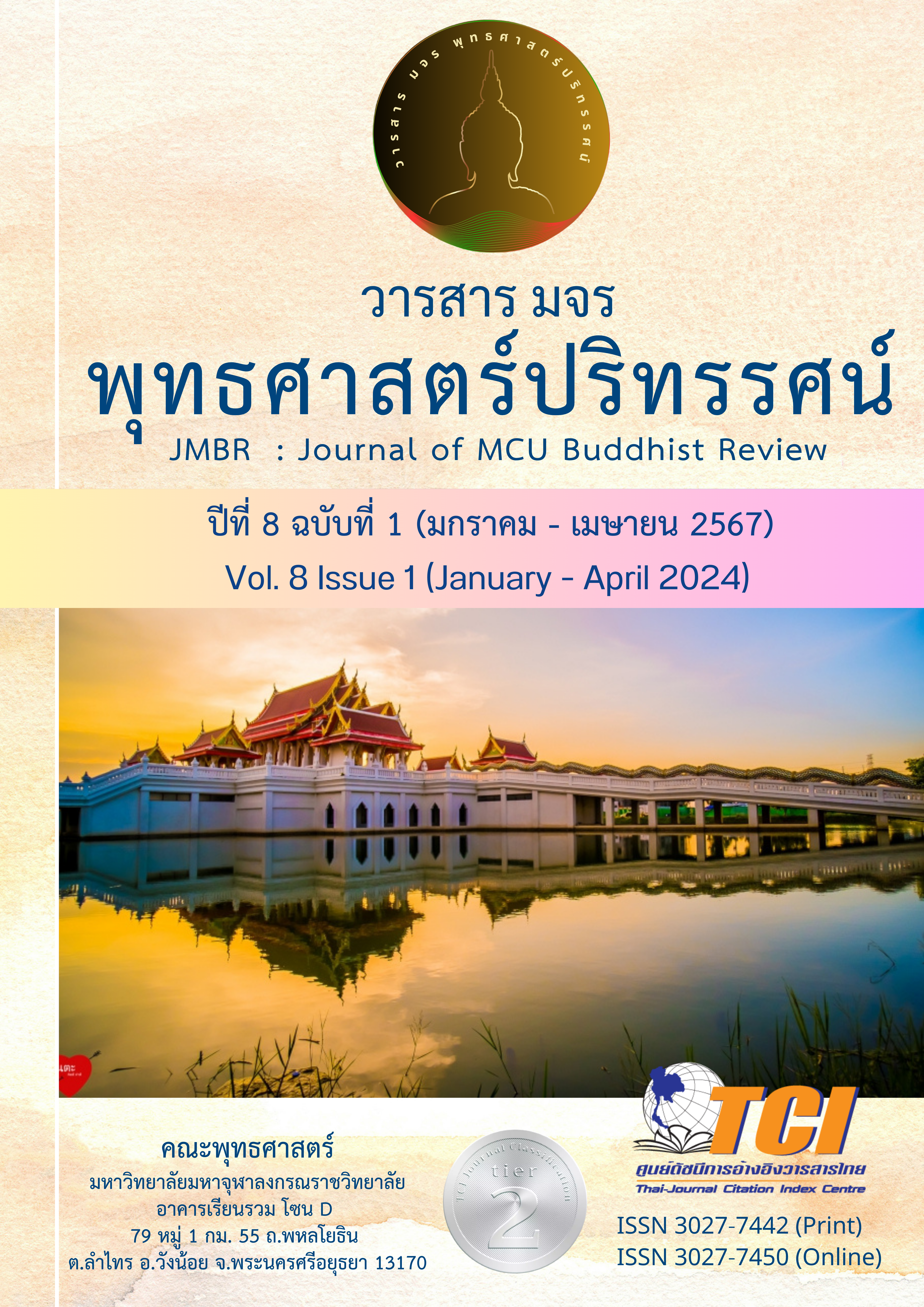The Practice of Mindful Bowing Meditation with Dhamma Music for Enhancing Mental Well-Being
Main Article Content
บทคัดย่อ
This research explored the problems when working women practiced meditation before going to bed at home and the practice of mindful bowing meditation with Dhamma music. The study was conducted with seventeen key informants. A qualitative methodology was used in this research. An in-depth interview was used to discover the problems working women had when practicing meditation at home and whether the practice could help improve their mental well-being. The results showed that the problems that seventeen Thai working women had when practicing at home were three hindrances which were sensual desire, sloth and torpor, and restlessness and anxiety. After seventeen Thai working women practiced meditation, the meditation could help enhance the mental well-being of working women. They were more mindful. They have positive feelings such as calmness, happiness, gentleness, and comfort. This mindful bowing meditation with Dhamma music can be an alternative practice for the employees at the organization to help them enhance their mental well-being.
Article Details

อนุญาตภายใต้เงื่อนไข Creative Commons Attribution-NonCommercial-NoDerivatives 4.0 International License.
- บทความที่ได้รับการตีพิมพ์เป็นลิขสิทธิ์ของวารสาร มจร พุทธศาสตร์ปริทรรศน์
- ข้อความใดๆ ที่ปรากฎในบทความที่ได้รับการตีพิมพ์ในวารสาร ถือเป็นความรับผิดชอบของผู้เขียนบทความ และข้อคิดเห็นนั้นไม่ถือว่าเป็นทัศนะและความรับผิดชอบของกองบรรณาธิการวารสาร มจร พุทธศาสตร์ปริทรรศน์
เอกสารอ้างอิง
Alshobaili, F. A. & AlYousefi, N. A. (2019). The effect of smartphone usage at bedtime on sleep quality among Saudi non- medical staff at King Saud University Medical City. Journal of family medicine and primary care. 8(6), 1953–1957. https://doi.org/10.4103 /jfmpc.jfmpc_269_19
Braun, V. & Clarke, V. (2012). Thematic analysis. In Cooper, H. Camic, P. M. Long, D. L. Panter, A. T. Rindskopf, D. & Sher, K. J. (Eds.), APA handbook of research methods in psychology. 12(2), (57–71).
Brown, K. W., & Ryan, R. M. (2003). The benefits of being present: Mindfulness and its role in psychological well-being. Journal of Personality and Social Psychology. 84(4), 822–848. https://doi.org/10.1037/0022-3514.84.4.822
De Witte, M. et al. (2019). Effects of music interventions on stress-related outcomes: A systematic review and two meta-analyses. Health Psychology Review. 14(2), 294–324. https://doi.org/10.1080/17437199.2019.1627897
Jones, B. J. et al. (2020). Mindfulness-based stress reduction benefits psychological well-being, sleep quality, and athletic performance in female collegiate rowers. Frontiers in Psychology. 20(11), 1-10. https://doi.org/10.3389/fpsyg.2020.572980
Huberty, J. et al. (2021). A mindfulness meditation mobile app improves depression and anxiety in adults with sleep disturbance: Analysis from a randomized controlled trial. General Hospital Psychiatry. 21(73), 30–37. https://doi.org/10.1016/j.genhosppsych. 2021.09.004
Ladpli, C. (2023). Acupuncture Treatment for Patients with Physical Illnesses through Mindfulness Meditation with Dhamma Music. Doctoral dissertation. Mahachula- longkornrajavidyalaya University.
Lindsay, E. K. et al. (2018). How mindfulness training promotes positive emotions: Dismant- ling acceptance skills training in two randomized controlled trials. Journal of Personality and Social Psychology. 115(6), 944–973. doi:https://doi.org/10.1037 /pspa0000134
Maxwell, L., & Duff, E. (2016). Mindfulness: An Effective Prescription for Depression and Anxiety. The Journal for Nurse Practitioners. 12(6), 403-409. doi:https://doi.org/ 10.1016/j.nurpra.2016.02.009
Osmanoglu, D. E., & Yilmaz, H. (2019). The effect of classical music on anxiety and well-being of university students. International Education Studies, 12(11), 18-22. https:// doi.org/10.5539/ies.v12n11p18
The Five Mental Hindrances and Their Conquest: Selected Texts from the Pali Canon and the Commentaries, compiled and translated by Nyanaponika Thera. (2013, November 30). Access to Insight (BCBS Edition). Retrieved 30 November 2023 from http://www .accesstoinsight.org/lib/authors/nyanaponika/wheel026.html .
Seinfeld, S. et al. (2016). Influence of music on anxiety induced by fear of heights in virtual reality. Frontiers in Psychology. 16(6), 1-12 https://doi.org/10.3389/fpsyg.2015 .01969
Phra Sukheesom Jiramahasuwan. (2023). A Creation of Meritorious Audio Environment for Home-Treatment Patients in Chiang Rak Noi Sub-District, Thailand. Doctoral dissertation. Mahachulalongkornrajavidyalaya University.
WHO. (2004). Promoting mental health: concepts, emerging, evidence, practice: summary report. WHO: Geneva.
Van der Riet, P. et al. (2015). Piloting a stress management and mindfulness program for undergraduate nursing students: Student feedback and lessons learned. Nurse Education Today. 35(1), 44-49. doi:https://doi.org/10.1016/j.nedt.2014.05.003
Vasuratna, V. (2023). The Practice of Mindfulness Meditation with Dhamma gīta for Mental Well-Being: A Case Study of Working Women Practitioners at Buddhamahametta Foundation, Chiang Rak Noi, Phra Nakhon Si Ayutthaya. Doctoral dissertation. Mahachulalongkornrajavidyalaya University.


